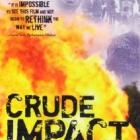Wood, James Jandak. Crude Impact. Sonoma: Vista Clara Films, 2006. 98 min. https://youtu.be/EwyAA2Zt8CI.
In 1956, M. King Hubbert, a geologist at Shell Research Labs, shocked the oil industry by predicting that United States oil production–the largest in the world at that time–would peak in the early 1970s, and then continuously and irreversibly diminish. His prediction was vilified and largely ignored–until it came true. This documentary film explores the interconnection between human domination of the planet, and the discovery and use of oil. It exposes our global, deep-rooted dependency on fossil fuel energy and examines the future implications of peak oil–the point in time when the amount of petroleum available worldwide begins a steady, inexorable decline. Journeying from the West African Delta region to the heart of the Amazon rainforest, from Washington to Shanghai, from early Man to the unknown future, Crude Impact chronicles the collision of our insatiable appetite for oil with the rights and livelihoods of indigenous cultures, other species and the planet itself. It highlights the underlying myths and beliefs that are propelling us toward what many experts believe will be a cataclysmic period for humanity but also chronicles hope, inspiration and change. (Source: Adapted from Lobitos Creek Ranch)
© 2006 Vista Clara Films, Inc. Trailer used with permission.
This film is available at the Rachel Carson Center Library (RCC, 4th floor, Leopoldstrasse 11a, 80802 Munich) for on-site viewing only. For more information, please contact library@rcc.lmu.de.
- Hartmann, Thom. Last Hours of Ancient Sunlight. Rev. and updated ed. New York: Three Rivers Press, 2004. First published 1998.
- Heinberg, Richard. PowerDown: Options and Actions for a Post-Carbon World. Gabriola Island, BC: New Society Publishers, 2004.
- Wackernagel, Mathis, and William Rees. Our Ecological Footprint: Reducing Human Impact on the Earth. Gabriola Island, BC: New Society Publishers, 1996.


